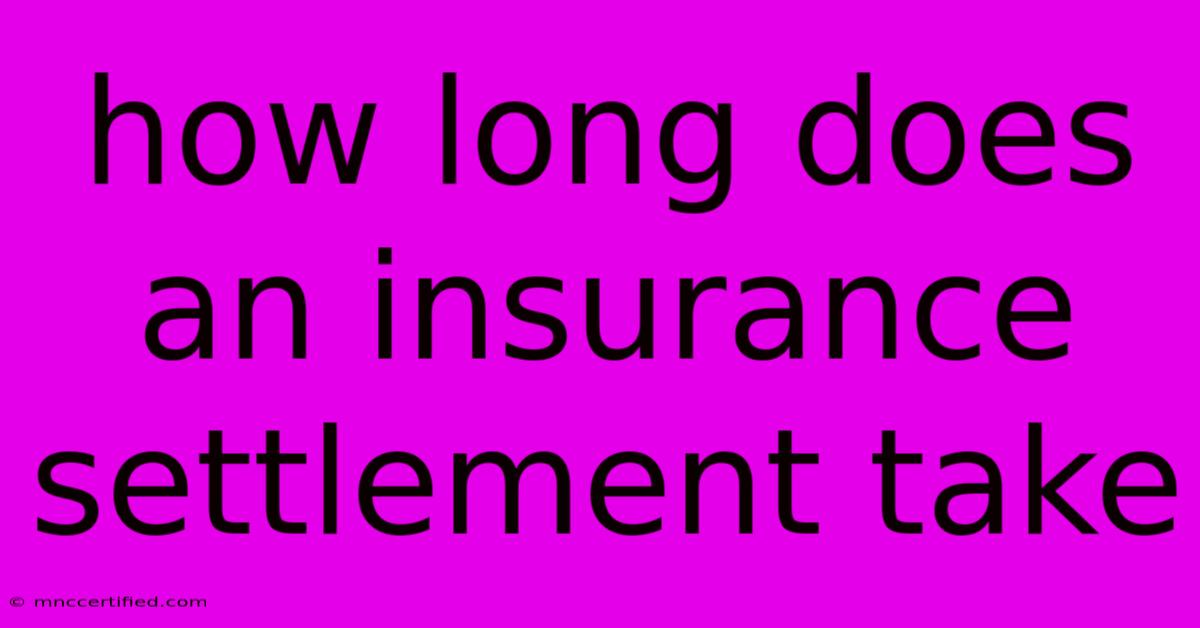How Long Does An Insurance Settlement Take

Table of Contents
How Long Does an Insurance Settlement Take? A Comprehensive Guide
Navigating the world of insurance claims can be a frustrating experience, especially when it comes to waiting for your settlement. You've been through a challenging event, and you need the funds to get back on your feet. So, how long does it actually take to receive an insurance settlement?
The answer, unfortunately, is not straightforward. There's no magic number, and the timeline can vary greatly depending on several factors. This guide will break down the key influences on your settlement timeframe, offer insights into the process, and equip you with tips to expedite the process.
Factors Influencing the Settlement Timeline
Here's a breakdown of the elements that can impact how long you wait for your insurance settlement:
- Type of Claim: Different claim types have different processing times. For example, a property damage claim from a fire might take longer than a simple auto claim for a fender bender.
- Complexity of the Claim: The more complex your claim is, the longer it will take to process. Multiple parties involved, extensive damage, or disputed liability can all contribute to a longer timeline.
- Insurance Company Policies: Each insurance company has its own internal processes and procedures, which can affect the speed of claim processing.
- Cooperation from the Policyholder: Your level of cooperation can significantly impact the timeline. Providing all necessary documentation promptly, responding to inquiries quickly, and being transparent will help move the process along.
- State Regulations: Different states have different regulations governing insurance claim processing. Some states may have stricter deadlines than others.
- Legal Action: If your claim goes to court, the process will be considerably longer.
Understanding the Claims Process
Here's a typical breakdown of the steps involved in a standard insurance claim:
- File the Claim: Contact your insurance company and report the incident.
- Investigation: The insurance company will investigate the claim, reviewing the details, evidence, and any documentation you provide.
- Damage Assessment: If it's a property claim, the insurance company will send an adjuster to assess the damage.
- Negotiation: Once the investigation and damage assessment are complete, you'll negotiate the settlement amount with the insurance company.
- Payment: If you agree to the settlement, the insurance company will issue payment.
How to Speed Up Your Settlement
While you can't control every aspect of the process, there are steps you can take to potentially expedite the timeline:
- Document Everything: Keep detailed records of the incident, including dates, times, names of witnesses, and any supporting documentation.
- Respond Promptly: Respond to any inquiries from the insurance company promptly and provide all required information.
- Be Transparent: Be honest and forthcoming with the insurance company about the incident and any relevant details.
- Understand Your Policy: Familiarize yourself with your insurance policy and know your coverage limits and exclusions.
- Hire a Public Adjuster: A public adjuster can represent you in dealing with the insurance company and may help speed up the process.
- Consider Mediation: If you're facing a dispute with the insurance company, mediation can help resolve issues and reach a quicker settlement.
Be Patient and Persistent
Remember, the insurance claims process can be lengthy and frustrating. Be patient, stay organized, and keep track of all communications and deadlines. If you encounter delays or roadblocks, don't hesitate to reach out to your insurance company and advocate for your claim.
By understanding the factors that influence the timeline, following best practices, and staying proactive, you can increase the chances of receiving your insurance settlement sooner rather than later.

Thank you for visiting our website wich cover about How Long Does An Insurance Settlement Take. We hope the information provided has been useful to you. Feel free to contact us if you have any questions or need further assistance. See you next time and dont miss to bookmark.
Featured Posts
-
Does Taking Driving School Lower Insurance
Nov 07, 2024
-
Californias Prop 36 Criminal Justice Reform Passes
Nov 07, 2024
-
Lurie Leads Early In San Francisco Mayoral Race
Nov 07, 2024
-
Elon Musks Dogecoin Rallies After Trump Visit
Nov 07, 2024
-
Elon Musk Praised By Trump In Victory Speech
Nov 07, 2024